The RFID Tester Market is estimated to be valued at USD 4.2 billion in 2025 and is projected to reach USD 7.9 billion by 2035, registering a compound annual growth rate (CAGR) of 6.5% over the forecast period.
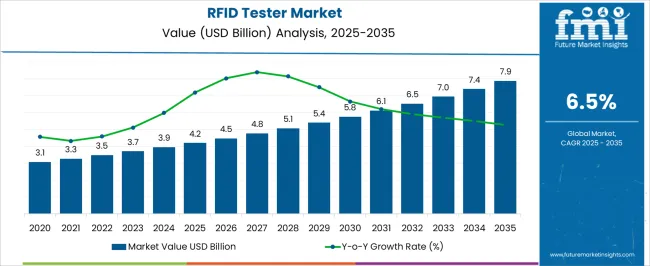
| Metric | Value |
|---|---|
| RFID Tester Market Estimated Value in (2025 E) | USD 4.2 billion |
| RFID Tester Market Forecast Value in (2035 F) | USD 7.9 billion |
| Forecast CAGR (2025 to 2035) | 6.5% |
The RFID Tester market is experiencing strong growth as organizations increasingly rely on radio frequency identification systems for inventory management, asset tracking, security, and process automation. The current market scenario reflects widespread adoption across industries where accurate and efficient testing of RFID tags and readers is critical to operational reliability.
In 2025, the market is being driven by technological advancements in RFID solutions, such as improved tag sensitivity, advanced reader protocols, and the integration of software-defined testing platforms. Increased focus on supply chain optimization, regulatory compliance, and enhanced asset visibility is supporting demand for testing solutions.
Additionally, the rising implementation of RFID in aerospace and defense, logistics, retail, and manufacturing has created a need for high-precision tester devices to ensure performance, durability, and interoperability As industries move toward automation and intelligent tracking systems, the RFID Tester market is expected to continue expanding, offering opportunities for testers that can support multiple frequency bands, high-speed validation, and real-time analytics while reducing operational errors and downtime.
The rfid tester market is segmented by application, end use, frequency band, and geographic regions. By application, rfid tester market is divided into Aerospace And Defense, Automotive, Retail And Consumer Goods, Logistics And Supply Chain, Healthcare, Pharmaceuticals, Agriculture, Government, and Others. In terms of end use, rfid tester market is classified into RFID Manufacturers, RFID Regulatory Bodies, and Others. Based on frequency band, rfid tester market is segmented into Ultra-High Frequency, Low Frequency, High Frequency, Microwave, and Ultra Wideband. Regionally, the rfid tester industry is classified into North America, Latin America, Western Europe, Eastern Europe, Balkan & Baltic Countries, Russia & Belarus, Central Asia, East Asia, South Asia & Pacific, and the Middle East & Africa.
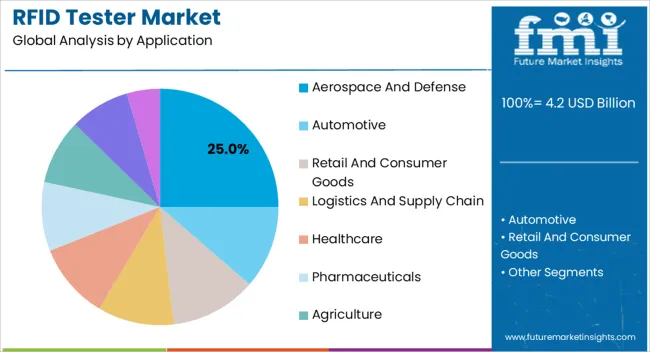
The Aerospace and Defense application segment is projected to hold 25.00% of the RFID Tester market revenue share in 2025, establishing it as the leading application segment. Growth in this segment is being supported by the critical need for highly reliable RFID systems in defense equipment, aviation logistics, and secure inventory tracking. RFID Tester adoption has been favored because it enables validation of tag readability, signal strength, and durability under extreme environmental conditions, which are essential for aerospace and defense operations.
The complexity of supply chains in this sector has made accurate testing indispensable, ensuring compliance with industry standards and operational safety. Increased investment in automated logistics, defense infrastructure, and high-value asset tracking has further reinforced the segment’s growth.
The ability of RFID Testers to conduct rapid, repeatable testing while supporting emerging protocols and tag types has strengthened the segment’s leadership As the aerospace and defense industry continues to modernize, the demand for high-performance RFID testing solutions is expected to remain strong.
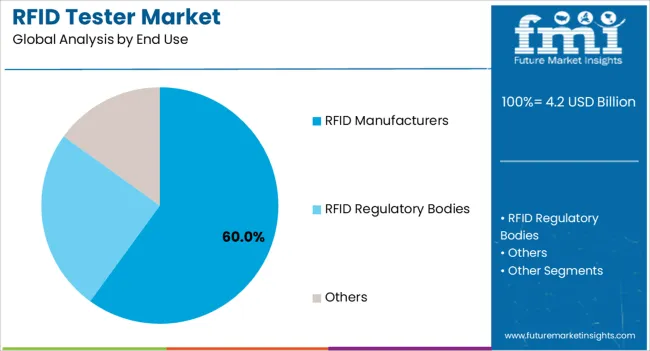
The RFID Manufacturers end-use segment is anticipated to capture 60.00% of the market revenue in 2025, positioning it as the largest end-use industry for RFID Testers. This dominance is being driven by the need for rigorous quality assurance and performance validation during the manufacturing of RFID tags and readers. Adoption has been accelerated by the requirement to meet global compliance standards, reduce product failures, and ensure interoperability across multiple systems and frequency bands.
RFID Testers provide manufacturers with tools to measure signal strength, read/write performance, and environmental resilience of devices before deployment. The ability to quickly and efficiently test large volumes of tags and readers has lowered operational costs and improved production efficiency.
Manufacturers are increasingly investing in automated and software-driven testing platforms to maintain high throughput while ensuring accuracy As the RFID market continues to expand across retail, transportation, and defense sectors, the need for reliable and versatile testing solutions by manufacturers is expected to sustain the segment’s market leadership.
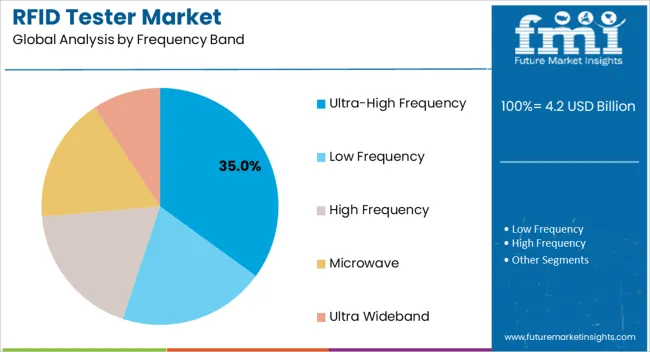
The Ultra-High Frequency segment is expected to hold 35.00% of the RFID Tester market revenue in 2025, emerging as the leading frequency band segment. Growth in this segment is being influenced by the widespread deployment of UHF RFID systems for long-range tracking, warehouse management, and supply chain visibility.
UHF RFID Testers are preferred because they allow accurate measurement of read ranges, signal integrity, and performance under real-world conditions, ensuring that tags and readers operate efficiently over extended distances. Adoption has been supported by industries requiring rapid scanning and automated inventory processes, as UHF technology provides higher throughput compared with lower frequency bands.
The flexibility of UHF Testers to support multiple tag protocols, environmental conditions, and dynamic testing scenarios has further strengthened this segment As supply chains, logistics, and manufacturing operations increasingly depend on high-speed and long-range RFID solutions, the Ultra-High Frequency segment is projected to maintain its market leadership through robust testing and quality assurance practices.
The growing adoption of RFID technology is fuelling the demand for RFID testers, and is significantly driving the global RFID tester market. RFID is wireless technology that uses electrostatic or electromagnetic coupling in the radio frequency (RF) portion of the electromagnetic spectrum for identification. To ensure the operability of products, globally, multiple standards have been developed.
RFID testers read passports, cards, smartphones, readers, and others in order to check compliance. The increasing need for RFID technology in the healthcare sector is one of the primary drivers for the global RFID tester market. In the healthcare sector, the focus on RFID technology for the tracking and classification of medical instruments is rising, and this is expected to drive the demand for RFID testers.
Since RFID technology aids in improving supply chain efficiency, ensuring patient safety, and reduces human errors in healthcare processes, the demand for RFID testers is increasing.
The retail sector is another potential segment for RFID testers. The increasing demand for RFID technology from the retail sector in order to reduce supply chain complexity is contributing to the growth of the global RFID tester market. The increasing demand for efficient supply chain operations in the retail sector is leading to the increasing demand for RFID technology, and significantly contributing to the growth of the RFID tester market.
RFID tags and readers are deployed by retail shops for security purposes to prevent theft and loss. Companies are increasingly adopting automated item identification systems for supply chain management for improving inventory allocation efficiencies. The rising need for efficient supply chain management is expected to support the growth of the RFID and RFID tester market during the forecast period.
Moreover, it is a cost-effective solution for efficient operations. Several developments in RFID testers with reference to technology are expected to drive the growth of the global RFID tester market during the forecast period.
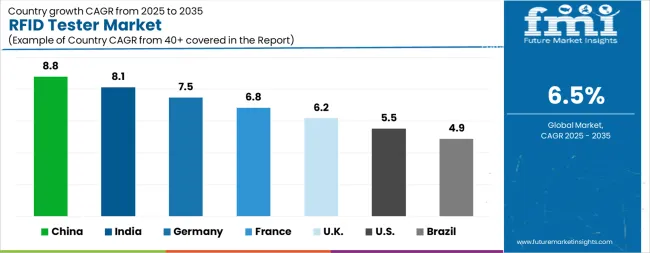
| Country | CAGR |
|---|---|
| China | 8.8% |
| India | 8.1% |
| Germany | 7.5% |
| France | 6.8% |
| UK | 6.2% |
| USA | 5.5% |
| Brazil | 4.9% |
The RFID Tester Market is expected to register a CAGR of 6.5% during the forecast period, exhibiting varied country level momentum. China leads with the highest CAGR of 8.8%, followed by India at 8.1%. Developed markets such as Germany, France, and the UK continue to expand steadily, while the USA is likely to grow at consistent rates. Brazil posts the lowest CAGR at 4.9%, yet still underscores a broadly positive trajectory for the global RFID Tester Market. In 2024, Germany held a dominant revenue in the Western Europe market and is expected to grow with a CAGR of 7.5%. The USA RFID Tester Market is estimated to be valued at USD 1.6 billion in 2025 and is anticipated to reach a valuation of USD 2.7 billion by 2035. Sales are projected to rise at a CAGR of 5.5% over the forecast period between 2025 and 2035. While Japan and South Korea markets are estimated to be valued at USD 206.8 million and USD 130.2 million respectively in 2025.
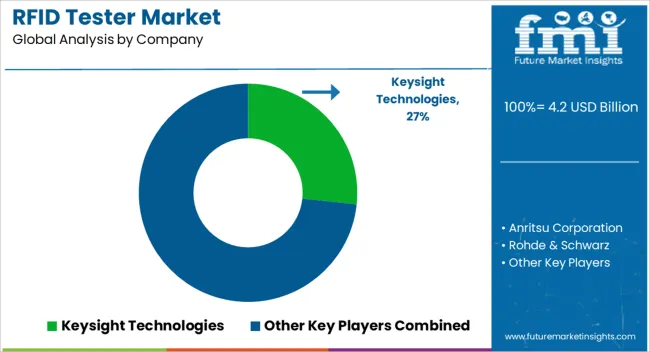
| Item | Value |
|---|---|
| Quantitative Units | USD 4.2 Billion |
| Application | Aerospace And Defense, Automotive, Retail And Consumer Goods, Logistics And Supply Chain, Healthcare, Pharmaceuticals, Agriculture, Government, and Others |
| End Use | RFID Manufacturers, RFID Regulatory Bodies, and Others |
| Frequency Band | Ultra-High Frequency, Low Frequency, High Frequency, Microwave, and Ultra Wideband |
| Regions Covered | North America, Europe, Asia-Pacific, Latin America, Middle East & Africa |
| Country Covered | United States, Canada, Germany, France, United Kingdom, China, Japan, India, Brazil, South Africa |
| Key Companies Profiled | Keysight Technologies, Anritsu Corporation, Rohde & Schwarz, National Instruments (NI), Tektronix (a subsidiary of Fortive), Spirent Communications, and VIAVI Solutions |
The global RFID tester market is estimated to be valued at USD 4.2 billion in 2025.
The market size for the RFID tester market is projected to reach USD 7.9 billion by 2035.
The RFID tester market is expected to grow at a 6.5% CAGR between 2025 and 2035.
The key product types in RFID tester market are aerospace and defense, automotive, retail and consumer goods, logistics and supply chain, healthcare, pharmaceuticals, agriculture, government and others.
In terms of end use, RFID manufacturers segment to command 60.0% share in the RFID tester market in 2025.






Our Research Products

The "Full Research Suite" delivers actionable market intel, deep dives on markets or technologies, so clients act faster, cut risk, and unlock growth.

The Leaderboard benchmarks and ranks top vendors, classifying them as Established Leaders, Leading Challengers, or Disruptors & Challengers.

Locates where complements amplify value and substitutes erode it, forecasting net impact by horizon

We deliver granular, decision-grade intel: market sizing, 5-year forecasts, pricing, adoption, usage, revenue, and operational KPIs—plus competitor tracking, regulation, and value chains—across 60 countries broadly.

Spot the shifts before they hit your P&L. We track inflection points, adoption curves, pricing moves, and ecosystem plays to show where demand is heading, why it is changing, and what to do next across high-growth markets and disruptive tech

Real-time reads of user behavior. We track shifting priorities, perceptions of today’s and next-gen services, and provider experience, then pace how fast tech moves from trial to adoption, blending buyer, consumer, and channel inputs with social signals (#WhySwitch, #UX).

Partner with our analyst team to build a custom report designed around your business priorities. From analysing market trends to assessing competitors or crafting bespoke datasets, we tailor insights to your needs.
Supplier Intelligence
Discovery & Profiling
Capacity & Footprint
Performance & Risk
Compliance & Governance
Commercial Readiness
Who Supplies Whom
Scorecards & Shortlists
Playbooks & Docs
Category Intelligence
Definition & Scope
Demand & Use Cases
Cost Drivers
Market Structure
Supply Chain Map
Trade & Policy
Operating Norms
Deliverables
Buyer Intelligence
Account Basics
Spend & Scope
Procurement Model
Vendor Requirements
Terms & Policies
Entry Strategy
Pain Points & Triggers
Outputs
Pricing Analysis
Benchmarks
Trends
Should-Cost
Indexation
Landed Cost
Commercial Terms
Deliverables
Brand Analysis
Positioning & Value Prop
Share & Presence
Customer Evidence
Go-to-Market
Digital & Reputation
Compliance & Trust
KPIs & Gaps
Outputs
Full Research Suite comprises of:
Market outlook & trends analysis
Interviews & case studies
Strategic recommendations
Vendor profiles & capabilities analysis
5-year forecasts
8 regions and 60+ country-level data splits
Market segment data splits
12 months of continuous data updates
DELIVERED AS:
PDF EXCEL ONLINE
RFID in Pharmaceuticals Market Size and Share Forecast Outlook 2025 to 2035
RFID-Integrated Smart Packaging Market Analysis - Size, Share, and Forecast Outlook 2025 to 2035
RFID Kanban Systems Market Size and Share Forecast Outlook 2025 to 2035
RFID Printers Market by Product Type, Printing Type, Industry, and Region – Growth, Trends, and Forecast through 2025 to 2035
RFID Blood Monitoring Systems Market Insights - Trends & Forecast 2024 to 2034
RFID Locks Market Analysis – Growth & Industry Trends 2023-2033
RFID Antenna Market
RFID Pallet Wrappers Market
RFID Portals For Doorways And Corridors Market
RFID Readers Market Analysis – Growth & Forecast 2017-2027
5G Tester Market Growth – Trends & Forecast 2019-2027
RF Tester Market Growth – Trends & Forecast 2019-2027
LAN tester Market Size and Share Forecast Outlook 2025 to 2035
SCC Tester Market Size and Share Forecast Outlook 2025 to 2035
LED Tester Market
DSL Tester Market Growth – Trends & Forecast 2019-2027
Drug Tester Market Size and Share Forecast Outlook 2025 to 2035
Gold Tester Market Size and Share Forecast Outlook 2025 to 2035
Tube Tester Market Size and Share Forecast Outlook 2025 to 2035
CCTV Tester Market Size and Share Forecast Outlook 2025 to 2035

Thank you!
You will receive an email from our Business Development Manager. Please be sure to check your SPAM/JUNK folder too.
Chat With
MaRIA